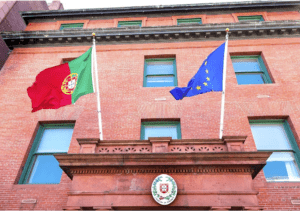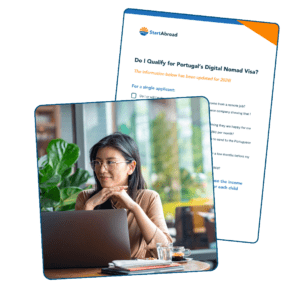
Portugal visa options
Portugal Country Guide
Everything you need to know about moving to Portugal
Exploring visa, residency, and citizenship options for expats moving to Portugal
Portugal offers a number of attractive visa options for expats
Portugal has a number of attractive visa options that can give expats access to to temporary residency, permanent residency, and even EU citizenship.
Navigate page
Overview of visa options in Portugal
There are many types of visas available to American and Canadian expats seeking to move to Portugal. These include:
- Passive Income (D7) Visa – A visa for those with passive income above Portuguese minimum wage (€820 in 2024)
Digital Nomad (D8) Visa – Ideal for remote workers or online business owners with a monthly income of 4x Portugal’s minimum wage (€3280 for 2024) or more.
D1 Work Visa – A traditional work visa, this visa allows foreign employees of Portuguese companies to get residency. Applicants must provide a work contract for at least 12 months and proof of accommodation.
- D3 Highly Qualified Worker Visa – Similar to the D1 visa, the D3 visa is a work visa granted to professionals with higher education in certain fields, including IT professionals, engineers, doctors, scientists, and top management.
- Golden Visa (Investment Visa) – A visa for those able to invest €250,000 or €500,000 in certain Portuguese industries or venture capital funds, those who create at least 10 jobs, or those who form commercial companies in Portugal and create at least five permanent jobs. Note that as of October 2023 real estate investments are no longer eligible investments for the golden visa in Portugal.
Entrepreneur (D2) Visa – A visa for entrepreneurs who want to start a business in Portugal.
- Family Reunification – For immediate family members of Portuguese citizens and residents
- Job Seeker Visa – A single-entry visa good for 120 days + 60 days with extension, that allows someone to seek employment in Portugal
Of these, the Passive Income (D7) and Digital Nomad (D8) Visas are most popular for American and Canadian expats. In this guide, we will explore those visas in depth. If you have questions about any of the other residency routes, please reach out to us at [email protected].
Portugal's D7 Visa
The easiest route to residency for retirees and those with passive income
What is Portugal’s D7 Visa?
Portugal’s D7 Visa is a passive income visa that gives foreigners the ability to settle in Portugal and eventually become permanent residents and citizens of the European Union. Applicants can qualify with pension income, rental income, or other types of passive income. The visa is granted for an initial period of 2 years, after which time it can be renewed for 3 years. At the end of the 3 years you are eligible to apply to become a permanent resident or citizen of Portugal.
Single applicants must demonstrate passive income above Portugal’s monthly minimum wage (€820 in 2024). To include dependents like a spouse or child the income amount must be higher – 50% more for each adult dependent and 30% more for each child.
There are a few additional requirements that applicants must know in advance:
- You must apply in your current country of residence.
- To qualify for your D7 renewal after 2 years, you must meet residency requirements. Specifically, you must be physically present in Portugal for at least 16 months out of your first 2 years. You also cannot leave Portugal for more than 6 months consecutively during your first 2 years.
- You must be able to secure accommodation in Portugal before applying. This can be a purchased home or a 12+ month lease.
- You will need to provide a criminal record certificate.
- You will need to open a Portuguese bank account before applying.
Expected Timeline for the D7 Visa
It takes time to apply and be approved for the D7 visa. While approval timelines vary depending where you apply and government backlog, a typical timeline may look like:
- Assemble paperwork and secure accommodation: 1-3 months
- Attend visa appointment: 1-2 days
- Await approval: 2-3 months
- Move to Portugal: 1-2 months
- Attend your final appointment with Immigration in Portugal: 1 day
Expected Fees for the D7 Visa
- Government application fees: approx. $90-110 per person
- VFS Global service fees (if applying through a VFS office): $40-50 per person
- Legal fees: $1000 – 3000
Would you like support with the D7 or Digital Nomad Visa?
StartAbroad offers Visa Application Services
Portugal's Digital Nomad Visa
The choice for professionals able to work remotely
What is Portugal’s Digital Nomad (D8) Visa?
Portugal’s Digital Nomad Visa is a relatively new visa option that was introduced in 2022. It allows remote workers, self-employed workers, contractors, and business owners to obtain residency in Portugal.
Unlike most other digital nomad visas, the Portuguese DNV provides a route to permanent residency and citizenship. It is granted for an initial period of 2 years, can be renewed, and may be converted to Portuguese permanent residency or citizenship after just 5 years!
What are the requirements for Portugal’s Digital Nomad Visa?
There are five requirements you must know in advance before applying to Portugals’ digital nomad visa. Note that there are more requirements than these five items, but these are the most challenging and important to know before you commit to applying:
- Income requirement: to qualify for the DNV you must make at least 4 times the Portuguese minimum wage per month. In 2024 this amount is €3280 (based on a minimum wage of €820). To include dependents the amount must be higher – add another 50% for each adult dependent and 30% for each child.
- Work authorization and documents: You will need to present authorization from your employer or client(s) to qualify for Portugal’s digital nomad visa. This will be a letter, along with a contract, and perhaps other documents depending on your situation. Regardless, your employer will need to be comfortable with you working from Portugal and sign a document affirming this.
- Criminal record certificate: You will need to provide a background check or police report to qualify for the Portuguese digital nomad visa.
- Proof of accommodation: You will need to demonstrate accommodation in Portugal before applying to the digital nomad visa. This can take the form of a deed to a property you own or a lease of at least 12 months.
- Portuguese bank account: You will need to open a Portuguese bank account and fund it before applying to the Portuguese digital nomad visa.
Expected Timeline for the Digital Nomad Visa
It takes time to apply and be approved for the D8/Digital Nomad visa. While approval timelines vary depending where you apply and government backlog, a typical timeline may look like:
- Assemble paperwork and secure accommodation: 1-3 months
- Attend visa appointment: 1-2 days
- Await approval: 2-3 months
- Attend your final appointment with the Immigration Authority: 1 day, an in-person appointment in Portugal approximately 2-3 months after your visa approval
Expected Fees for the Digital Nomad Visa
- Government application fees: approx. $90-110 per person
- VFS Global service fees (if applying through a VFS office): $40-50 per person
- Legal fees: $1400-3000 if using traditional Portuguese law firms, $650-1000 working with StartAbroad
Do you Qualify for the Portugal Digital Nomad Visa?
Find out now using our simple cheatsheet.
Remember: StartAbroad is here to help
Questions? Email us at [email protected]
Not sure where to start?
Speak with an international relocation specialist for free
Helpful resources


Partner Article: Protect Yourself From Currency Volatility When Purchasing a Property in Portugal



Digital Nomads in Portugal or Spain – Which Country is Right for You?

Portugal Digital Nomad Visa 2023: How to Apply for the Portugal Digital Nomad Visa
Portugal client reviews

StartAbroad made the process easy and manageable. Anna is the BEST, she informed me of the necessary steps to get me to Portugal. StartAbroad helped with housing, needed documents, and the million questions I had. I highly recommend their services if you want an easy and very manageable process to travel and live overseas.
Joyce L.
Portugal Concierge Client

“I’m so glad StartAbroad exists! It made getting my digital nomad visa a breeze…Moving can be a challenge, so having a company like StartAbroad make the process easier meant there was one less thing to worry about. It gave me peace of mind and freed up my time to focus on other things.”
Elle H.
Digital Nomad Visa Client

“These guys saved our family so much time – it’s quite difficult to quantify the value of their service…clearly they care very much about what they are doing and their work reflects this. Thanks again guys!
Mateo
Digital Nomad Client
Join our mailing list
Receive monthly newsletters, special offers, insider information, and more.




